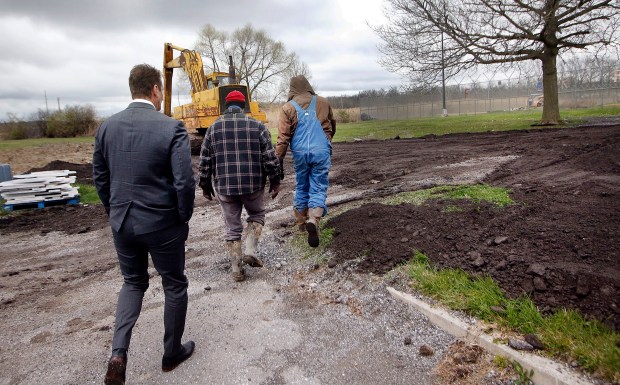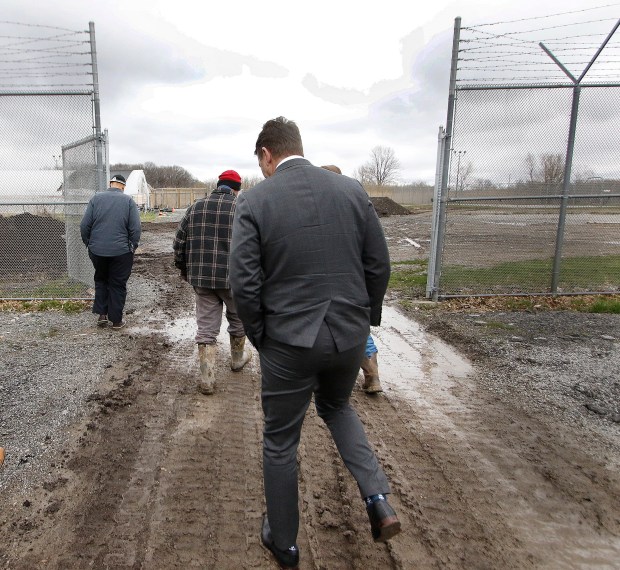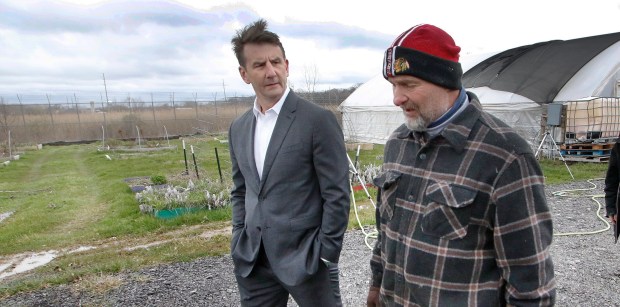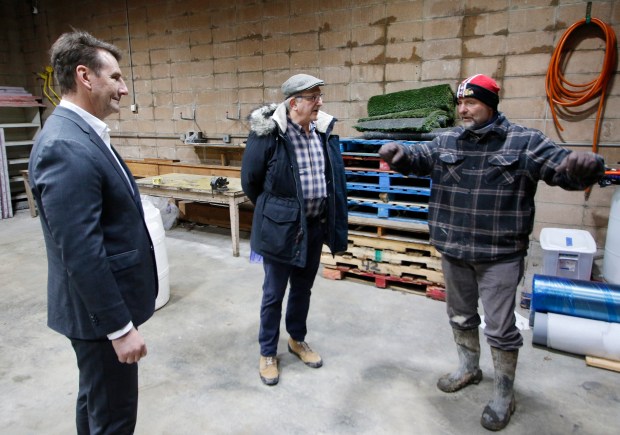Dressed in a flannel shirt, knit hat and rubber boots, Lake County Juvenile Court Senior Judge Thomas Stefaniak Jr. was unrecognizable as he guided an excavator around a fresh load of dirt in a lot adjacent to the Juvenile Justice Center on 93rd Avenue.
Stefaniak and other workers were trying to level at the entryway to the center’s flower farm, a project initiated by Stefaniak during the pandemic and intended to teach youth offenders skills like gardening, equipment operation and sales. The flowers that are grown and harvested by the youth who work the farm can be found on the tables in restaurants like Gino’s Steak House and Asparagus, he said.
While it may have looked like Stefaniak was off the clock with no judge’s robe or courtroom in sight, the work is part of a flower farm project that is paving the way for the Good For Youth Farm project — a continuation of efforts to provide youth in the system with exposure to other opportunities for their futures.
“It’s a way to socialize kids and get them to work a little bit,” Stefaniak said. The experience gives the youth a chance to learn about social skills and customer service as they deliver the flowers to their clients.
Youth working on the farm are given an introductory session on operating an excavator. Stefaniak said they are working on establishing a forklift certification program and basic truck driving literacy program to help give youth a leg up in finding employment.
Stefaniak, with the support of the Lake County Council through Councilman Ted Bilski, D-Hobart, is about to expand the farm operation to include a vertical garden. The pair were joined by project designer Robert Colangelo, founder of CEA Technologies Inc., in Chesterton and U.S. Rep. Frank Mrvan, D-Highland, among others, to tour the facility that will house the garden.

Bilski said the urge to break ground on an indoor garden project first cropped up several years ago at a conference in California he attended with other officials. It was where he first encountered an indoor garden and how these projects were being used to bring healthy foods to urban food deserts.
Work is underway to create a vertical garden where produce will be grown in one of the vacant storage garages at the juvenile center and in space outside the garage. The building abuts the flower farm and will have growing space outside for additional produce and greenhouses.
“Part of this (project) is building off what the judge started,” Colangelo said, adding the goal is to increase production capacity and increase the programs that benefit the community.

The vertical garden will be able to produce about 800 heads of lettuce per week in the building, year-round, once it is outfitted with proper heating and cooling, ventilation, and hydroponic growing system, along with about 3,100 pounds of tomatoes and 4,100 pounds of cucumbers seasonally outdoors. Food grown at the facility will be made available through a partnership with the Food Bank of Northwest Indiana.
“Right not we are trying to get some grants to get this off the ground,” Bilski said.
To that end, the Lake County Council Tuesday approved entering into a contract not to exceed $30,000 with Baker Tilly to assist in writing a grant application for the USDA’s Urban Agriculture and Innovative Production program. The project’s planners hope to secure up to $350,000 for construction and equipment to outfit the vertical garden. They are optimistic the application will be successful.

Officials hope to break ground on the first phase of the project this fall.
“This is really one of the few times there’s no one being a curmudgeon on this. It’s all good. It’s a great opportunity for all of us to throw in and do something positive,” Bilski said.
Bilski said the project could be a prototype of what can be done with the many vacant buildings that populate parts of Lake County. He would like to see the garden replicated throughout the region to address issues of food deserts and economic redevelopment.
“The potential of this really is amazing,” Bilski said.
The goal is to start small and build off of the successes by creating a workable plan, Colangelo said.
Chief Probation Officer Kevin Elkins said he never quite expected his job in probation to include so many outdoor activities, but he said those activities benefit the youth who wind up in the system.
“The philosophy has shifted to being more proactive,” Elkins said. The farming programs help expose the youth to opportunities that they may not have known existed, he said.
“For a lot of these kids, they have never been to a steak house. It’s interesting to take them to different areas they didn’t know exist,” Elkins said.
Some youth he encounters may live in cities like Gary but have never been to a Lake Michigan beach.
By showing youth the different opportunities that can exist for them when they make different choices, it can help change an individual’s trajectory, he said.
“In my book, we win,” Elkins said.





